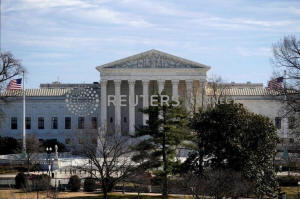|
U.S. high court to hear historic
electoral map manipulation cases
 Send a link to a friend
Send a link to a friend
 [March 26, 2019]
By Andrew Chung and Lawrence Hurley [March 26, 2019]
By Andrew Chung and Lawrence Hurley
WASHINGTON (Reuters) - In two cases that
could reverberate through U.S. politics for years to come, the Supreme
Court is set on Tuesday to hear arguments over the contentious practice
of manipulating electoral district boundaries to entrench one party in
power.
The justices last year failed to deliver a definitive ruling on the
legality of the practice, called partisan gerrymandering. They will get
another chance in cases challenging North Carolina's Republican-drawn
statewide U.S. House of Representatives map and a single
Democratic-drawn House district in Maryland.
Critics have said gerrymandering has become increasingly effective and
insidious by using precise voter data and powerful computer software.
The result in many states has been the creation of electoral districts,
sometimes oddly shaped to include or exclude certain localities, that
maximize one party's chances of winning and diluting the clout of voters
who tend to support the other party.
Gerrymandering also tends to foster the election of candidates with more
extreme views at the expense of moderates, according to critics, adding
to U.S. political polarization.

The two cases are among the most important that the court will consider
in its current term, with rulings due by the end of June. The outcome
could impact U.S. elections for decades either by allowing federal
courts to curb partisan gerrymandering or by removing their power to do
so, giving gerrymandering-minded state legislators a freer hand.
Gerrymandering is carried out by cramming as many like-minded voters as
possible into a small number of districts and spreading the rest in
other districts too thinly to form a majority.
Plaintiffs in the two cases - Democratic voters in North Carolina and
Republican voters in Maryland - have said the maps were drawn to
diminish their voting power, violating their constitutional rights. In
both cases, lower courts ruled that the contested districts violated the
U.S. Constitution's guarantee of equal protection under the law, the
right to free speech and association, or constitutional provisions
governing elections.
While the Supreme Court, which currently has a 5-4 conservative
majority, has ruled in the past against gerrymandering intended to harm
the electoral clout of racial minorities, it has never reined in
gerrymandering carried out purely for partisan advantage.
Some conservative Supreme Court justices have been skeptical that courts
could properly measure when maps are too partisan. In a 2004 case,
former Justice Anthony Kennedy, a conservative who sometimes voted with
the liberals in key cases, left open the door for a "workable standard"
to be found.
[to top of second column]
|

he Supreme Court building is seen from the U.S. Capitol in
Washington, U.S., February 15, 2019. REUTERS/Joshua Roberts/File
Photo

Kennedy retired last year and was replaced by Republican President
Donald Trump's conservative appointee Brett Kavanaugh, whose views
on gerrymandering are unknown.
North Carolina's Republican legislators have said judges are not
equipped to determine how much politics is too much in electoral
line-drawing. Plaintiffs have said turning away gerrymandering
claims would be a green light for even more ruthless redistricting.
The North Carolina case focuses on how Republican legislators
reworked House districts in 2016 to ensure that 10 Republicans were
elected to House seats, compared to just three Democrats, in a state
whose voters are closely divided between the two parties. Noting
that partisan gerrymandering was not illegal, Republicans were open
about their intent.
(To see a graphic showing the effect of the plan in Greensboro,
North Carolina, click here: https://tmsnrt.rs/2HC8mvU)
"I think electing Republicans is better than electing Democrats,"
state House Representative David Lewis said at the time.
Using those words as evidence, more than two dozen Democratic
voters, the North Carolina Democratic Party and two groups that
advocate for fair elections sued.
In the Maryland case, Republican voters sued after the
Democratic-controlled legislature redrew boundaries of their House
district in a way that removed Republican-leaning areas and added
Democratic-leaning areas. The move flipped the seat from Republican
to Democrat.

Legislative districts across the country are redrawn to reflect
population changes determined by the federal census each decade. In
most states, redistricting is done by the party in power, though
some assign the task to independent commissions in the interest of
fairness.
(Reporting by Andrew Chung; Editing by Will Dunham)
[© 2019 Thomson Reuters. All rights
reserved.]
Copyright 2019 Reuters. All rights reserved. This material may not be published,
broadcast, rewritten or redistributed.
Thompson Reuters is solely responsible for this content. |